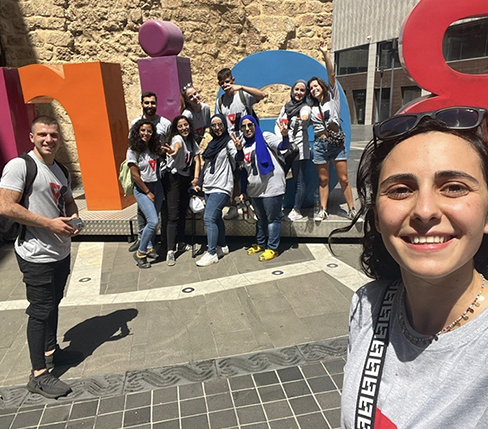YMCA's peace camps needed in Lebanon that suffers from many crises

YMCA’s peace training increases the inclusion of young people and advances their basic rights. YMCA Lebanon’s pilot scheme is implemented with the support of YMCA Finland.
17.11.2022
The last few years burdened by worries
The last few years have been exceptionally challenging for the face-to-face activities organised by YMCA Lebanon. Instability and uncertainty have increased significantly in the country since the fall of 2019, and the economy’s downward spiral is still accelerating. Demonstrations, unrest, political turbulence, the Covid-19 pandemic, the Beirut blast, the currency and banking crisis that escalated during 2021, have all led to hyperinflation and an acute fuel shortage. Like a domino effect all the factors have affected the functioning of an entire society, living conditions, the availability of basic services and goods, from daily access of bread to electricity, from pharmaceuticals to fuel. Hyperinflation has driven more than 80 percent of the population below the poverty line, affecting both Lebanese and Syrians.
YMCA’s pilot scheme youth peace education in Lebanon
The YMCA camp centre in Ras El Matn in the Lebanon Mountains has been able to start activities again after the break caused by the global pandemic. YMCA Lebanon has adapted its operations amidst the country’s accumulating challenges. The camp centre has piloted and organised a new training for young people on the themes of peace as part of the development cooperation programme implemented with YMCA Finland. In the tense societal circumstances, questions about confrontation and constructive interaction touch the participants. In the training, principles and values related to peaceful coexistence are brought up, and young people are encouraged to introduce these in their everyday lives. In the week-long workshops, peace is discussed in a variety of ways, and abstract themes are approached through concrete examples; partakers deal with attitudes and mediation from a personal point of view, for example, with the help of games and social exercise. Young people joining the camps come from different parts of the country, representing different religions and cultures, amongst them also Syrian youth. The camp environment enables them to get to know each other in a unique way, and the interaction shapes and strips away attitudes and prejudices that often appear in young people’s everyday life.
–For many, this is the first time they can stop and reassess their own identity and their own needs, YMCA Lebanon trainer Mireille Abi Khalil describes the powerful experiences of the young people who have participated in the peace training. Another one of the trainers, Claude Geagea, emphasises on how important it has been to re-establish relationships and strengthen human connection after the isolation that the pandemic brought about.
25-year-old Dima Alameddine (in the photo on the front right), who participated in the camp, reflects on how the chain of crises affects the moods and motivation of Lebanese youth. The August 2020 explosion in Beirut has been found to have caused post-traumatic stress disorders, especially among children and young people. Also the Covid and economic crisis with the existing country’s political instability have increased anxiety and mental health problems among youth. Many live in a constant state of survival and without future prospects. The opportunity to build communities among young people from different parts of the country is, thus, on the same token an opportunity to break away from everyday challenges, create new friendships and networks to work for a better future. The camp environment also has its own magic, which often knits different groups together.
Peace trainings increase the inclusion of young people
YMCA’s added value lies precisely in the way it deals with youth – if we want young people to contribute in peace efforts and prevent violence and conflicts, we need to know how to do it in a way that not only refelcts them but has a certain appeal to them. The engine of the uprising (or thawra, in Arabic) that started in 2019 was mainly young people’s demands for political and structural reform. When the demands for change put forward by them failed due to the lack of effective political actions, and the unwillingness of the ruling elite to correct the representation of decision making, with the corona crisis extinguishing even the last glimmers of hope for change, many fell into a total void. Young people all over Lebanon desperately need an opportunity to participate and make their voices heard. Peace training not only increases the experience of young people’s participation and relevance, but also promotes their basic rights. One of the most far-reaching amongst them is the right to participate in peace and security themes and issues.
The peace work is carried out as a part of the development cooperation programme of YMCA Finland and is implemented together with YMCA partners around the world. The YMCAs support young people, and women in particular, to acquire the skills required for building peace, and offer them platforms to promote peace in youth’s own communities. Three peace camps have already been organised in Lebanon during 2022. The participants involved have been enthusiastic about the camps and hope to have a follow-on programme.






